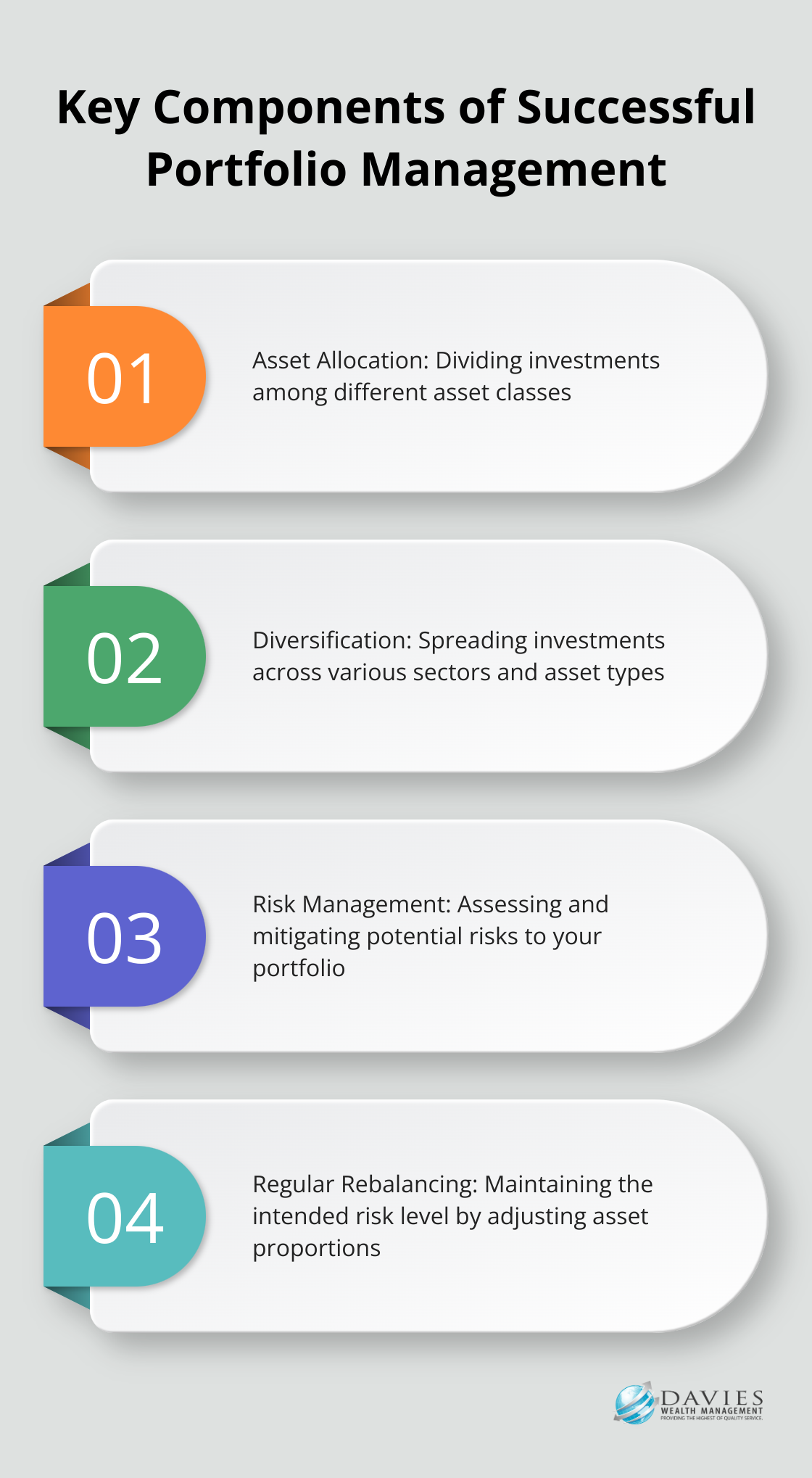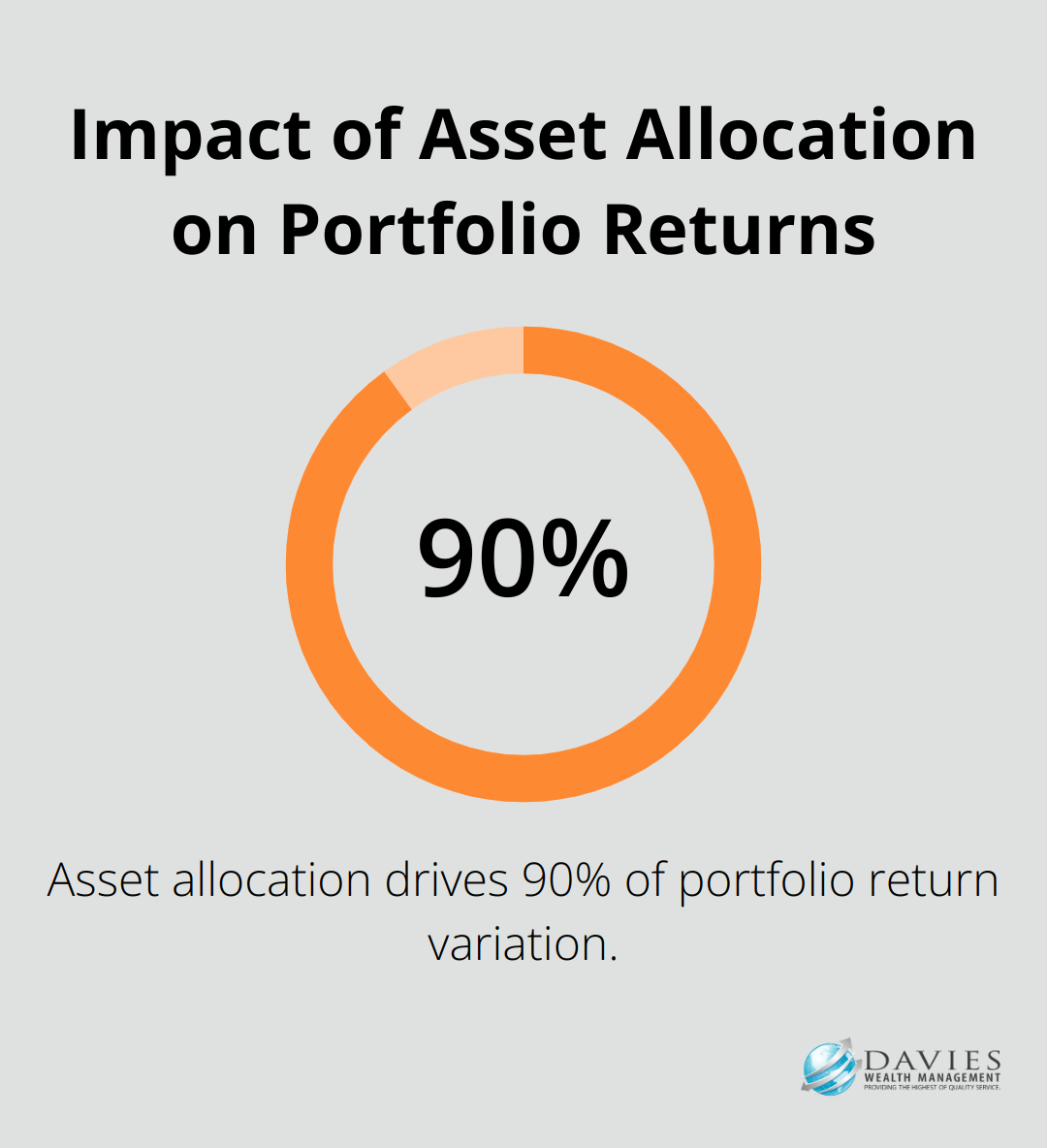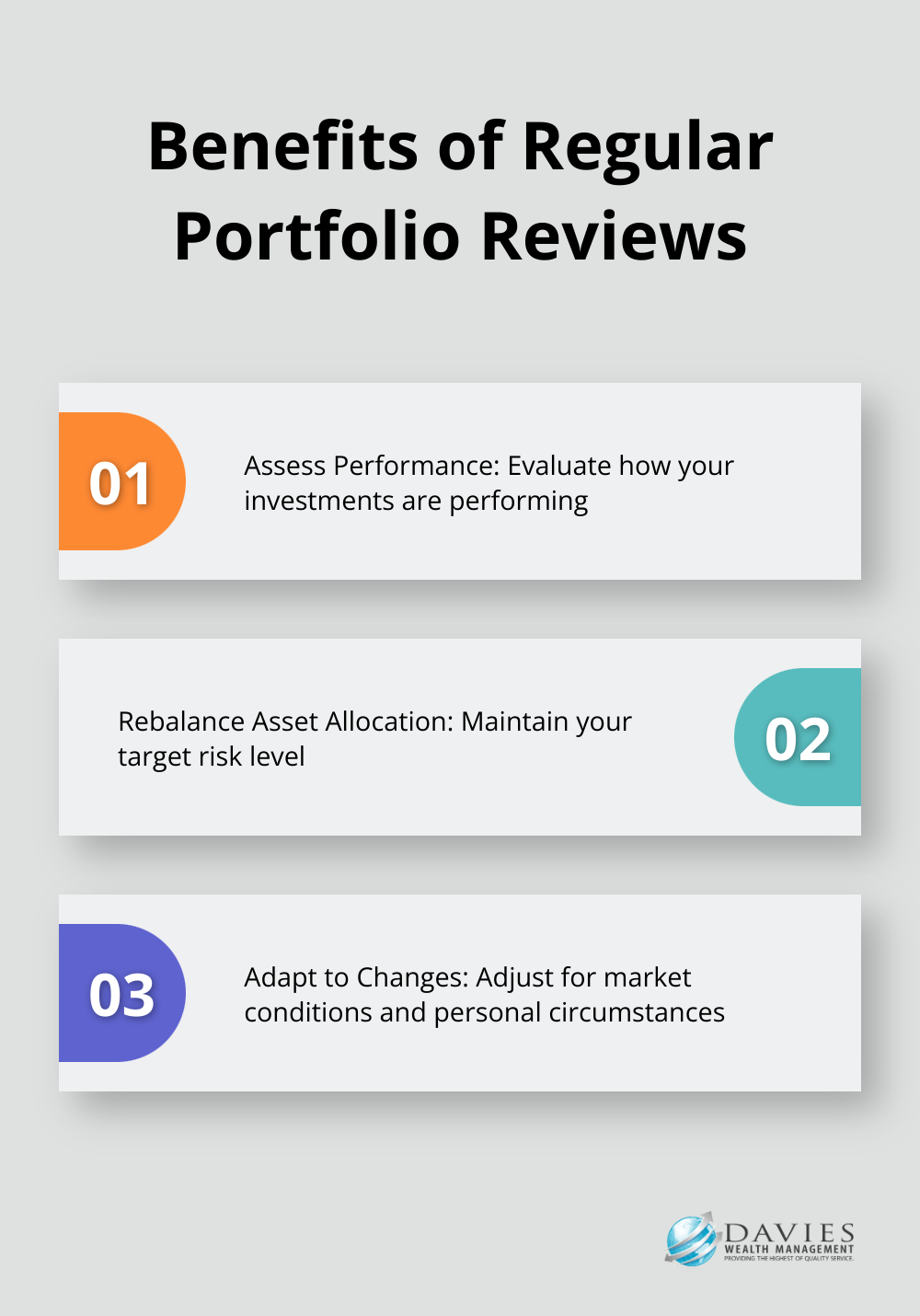At Davies Wealth Management, we understand the power of effective portfolio management in achieving financial success.
Portfolio management is the art and science of making strategic investment decisions to maximize returns while minimizing risks.
The advantages of portfolio management include improved risk control, better asset allocation, and enhanced long-term financial performance.
In this post, we’ll explore how you can leverage these benefits to build and maintain a robust investment portfolio that aligns with your financial goals.
What Is Portfolio Management?
The Essence of Portfolio Management
Portfolio management involves selecting and overseeing a group of investments that meet a client’s long-term financial objectives and risk tolerance. It involves the strategic selection, monitoring, and adjustment of investments to optimize returns while managing risks. This process aligns with your specific financial objectives, risk tolerance, and time horizon.
Effective portfolio management requires a comprehensive understanding of various asset classes, market dynamics, and economic factors. It’s not a one-time task but a continuous process of evaluation and adjustment to ensure your investments remain in line with your goals as market conditions fluctuate.
Key Components for Success
Several critical elements contribute to successful portfolio management:

- Asset Allocation: This component divides your investments among different asset classes (stocks, bonds, real estate, and cash). Portfolio optimization is about choosing the best mix of assets to increase returns and reduce risk.
- Diversification: This strategy spreads investments across various sectors and asset types to reduce risk and potentially enhance returns.
- Risk Management: This aspect assesses and mitigates potential risks to your portfolio (market volatility, inflation, or geopolitical events).
- Regular Rebalancing: As market conditions change, your portfolio may shift from its target allocation. Regular rebalancing helps maintain the intended risk level by adjusting the proportions of different asset classes.
Tailoring Your Approach
Portfolio management isn’t a one-size-fits-all approach. Different strategies suit different investors:
- Active Management: This strategy involves frequent buying and selling to outperform the market. It requires in-depth research and quick decision-making.
- Passive Management: This approach aims to match market performance by investing in index funds or ETFs. It’s generally less time-intensive and can prove more cost-effective.
- Core-Satellite Approach: This method combines passive investing for the portfolio’s core with active management for potentially higher returns in specific areas.
Customized Solutions for Unique Situations
At Davies Wealth Management, we customize our portfolio management approach to each client’s unique situation. Our work with professional athletes, for example, often involves a more dynamic strategy to account for their unique income patterns and career timelines.
Regardless of the specific strategy, effective portfolio management demands discipline, patience, and a long-term perspective. It requires informed decisions based on thorough research and a clear understanding of your financial goals.
As we move forward, let’s explore how to build a robust portfolio that aligns with your financial objectives and risk tolerance. This next section will provide practical insights into asset allocation, diversification, and risk management strategies that can help you create a strong foundation for your investment journey.
Building Your Winning Portfolio
The Power of Asset Allocation
At Davies Wealth Management, we understand that constructing a robust portfolio forms the foundation of successful investing. Asset allocation plays a pivotal role in this process. It involves dividing your investments among different asset categories (such as stocks, bonds, real estate, and cash). A study estimated that nearly 90 percent of portfolio return variation is driven by asset allocation. This statistic underscores the importance of how you divide your money among asset classes, which outweighs the specific investments you choose within those classes.

Your asset allocation should reflect your risk tolerance, investment timeline, and financial goals. For instance, a younger investor with a long investment horizon might allocate a larger percentage to stocks for potential growth. Conversely, an investor nearing retirement might shift towards more conservative investments like bonds to preserve capital.
Diversification: Spreading Your Risk
Diversification complements asset allocation by spreading investments across various vehicles, industries, and companies. A well-diversified portfolio typically includes a mix of domestic and international stocks, government and corporate bonds, real estate investment trusts (REITs), and alternative investments.
Instead of concentrating all your funds in one sector (like tech stocks), you should spread them across different areas such as healthcare, consumer goods, and energy. This approach helps mitigate the impact of poor performance in any single area and can potentially enhance returns over time.
Risk Assessment and Management
Evaluating potential threats to your investments and implementing strategies to mitigate them forms a critical component of portfolio management. Common risks include market volatility, inflation, and liquidity issues.
Practical risk management strategies include:
- Stop-loss orders: These automatically sell a security when it drops to a certain price.
- Dollar-cost averaging: This involves investing a fixed amount regularly, regardless of market conditions, which can help manage market volatility and enhance portfolio growth over time.
Balancing Short-Term and Long-Term Objectives
Your portfolio should reflect both your immediate needs and future aspirations. Short-term goals might include saving for a house down payment or funding your child’s education, while long-term goals typically focus on retirement planning.
To address these varied objectives, consider creating separate “buckets” within your portfolio:
- Short-term goals (1-5 years): Focus on stable, liquid investments like high-yield savings accounts or short-term investment strategies.
- Medium-term goals (5-10 years): A mix of stocks and bonds might prove appropriate.
- Long-term goals (10+ years): You can afford to take on more risk with a higher allocation to stocks.
As we move forward, we’ll explore the importance of monitoring and adjusting your portfolio. This ongoing process ensures your investments remain aligned with your goals as market conditions evolve, maintaining the effectiveness of your financial strategy over time.
Monitoring and Adjusting Your Portfolio
The Importance of Regular Reviews
Effective portfolio management requires ongoing attention and periodic adjustments. At Davies Wealth Management, we recommend a proactive approach to portfolio monitoring. Quarterly reports help investors and analysts gauge the health of a company by providing insight into a firm’s performance. These regular check-ins allow you to assess your investments’ performance, rebalance your asset allocation, and make necessary adjustments based on changing market conditions or personal circumstances.

During these reviews, focus on your asset allocation. Over time, some investments may outperform others, causing your portfolio to drift from its target allocation. For instance, if stocks perform exceptionally well, they may represent a larger portion of your portfolio than intended (potentially exposing you to more risk).
Adapting to Market Changes
Financial markets are dynamic, influenced by various factors including economic conditions, geopolitical events, and technological advancements. Staying informed about these changes is essential for making timely adjustments to your portfolio.
Market conditions influence your asset allocation strategy, and learning to adapt is crucial for optimal investment success in a dynamic landscape. It’s important to note that adapting to market changes doesn’t mean reacting to every market fluctuation. Instead, it involves making thoughtful, strategic decisions based on thorough analysis and long-term trends.
Leveraging Technology for Portfolio Tracking
In today’s digital age, numerous tools and technologies can streamline the process of monitoring and adjusting your portfolio. Many financial institutions offer online platforms that provide real-time updates on your investments, allowing you to track performance, analyze asset allocation, and execute trades.
Advanced tactics in portfolio management include factor investing, risk parity, machine learning, alternative data, and dynamic allocation. These tools can significantly enhance your ability to make informed decisions about your investments.
However, while technology can provide valuable insights, it’s important to combine these tools with professional expertise. At Davies Wealth Management, we utilize cutting-edge portfolio management software alongside our team’s extensive experience to provide comprehensive, personalized investment strategies.
Tailoring Strategies for Unique Situations
Our approach is particularly beneficial for clients with complex financial situations (such as professional athletes). We understand that their unique income patterns and career timelines require more frequent portfolio reviews and adjustments. Our specialized expertise in this area allows us to provide tailored solutions that address these specific challenges.
While regular monitoring and adjustment are important, it’s equally vital to maintain a long-term perspective. Try to avoid overreacting to short-term market volatility, and always consider how any changes align with your overall financial goals and risk tolerance.
Final Thoughts
Effective portfolio management offers numerous advantages that significantly impact long-term wealth. It provides stability during market volatility, capitalizes on growth opportunities, and helps navigate complex financial landscapes with confidence. Portfolio management allows investors to adapt to changing market conditions and personal circumstances while maintaining focus on long-term objectives.
Professional guidance proves invaluable in effective portfolio management. At Davies Wealth Management, we provide personalized portfolio management solutions tailored to unique situations. Our team of experts helps navigate the complexities of investment strategies, risk management, and market analysis, ensuring portfolios remain optimized for financial goals.
Successful portfolio management requires vigilance, adaptability, and a long-term perspective. It considers all aspects of financial life, from tax-efficient investing to estate planning. With the right strategies and professional support, investors can harness the full potential of their investments and work towards a secure financial future.
✅ BOOK AN APPOINTMENT TODAY: https://davieswealth.tdwealth.net/appointment-page
===========================================================
SEE ALL OUR LATEST BLOG POSTS: https://tdwealth.net/articles
If you like the content, smash that like button! It tells YouTube you were here, and the Youtube algorithm will show the video to others who may be interested in content like this. So, please hit that LIKE button!
Don’t forget to SUBSCRIBE here: https://www.youtube.com/channel/UChmBYECKIzlEBFDDDBu-UIg
✅ Contact me: TDavies@TDWealth.Net
====== ===Get Our FREE GUIDES ==========
Retirement Income: The Transition into Retirement: https://davieswealth.tdwealth.net/retirement-income-transition-into-retirement
Beginner’s Guide to Investing Basics: https://davieswealth.tdwealth.net/investing-basics
✅ Want to learn more about Davies Wealth Management, follow us here!
Website:
Podcast:
Social Media:
https://www.facebook.com/DaviesWealthManagement
Tweets by TDWealthNet
https://www.linkedin.com/in/daviesrthomas
https://www.youtube.com/c/TdwealthNetWealthManagement
Lat and Long
27.17404889406371, -80.24410438798957
Davies Wealth Management
684 SE Monterey Road
Stuart, FL 34994
772-210-4031
#Retirement #FinancialPlanning #wealthmanagement
DISCLAIMER
The content provided by Davies Wealth Management is intended solely for informational purposes and should not be considered as financial, tax, or legal advice. While we strive to offer accurate and timely information, we encourage you to consult with qualified retirement, tax, or legal professionals before making any financial decisions or taking action based on the information presented. Davies Wealth Management assumes no liability for actions taken without seeking individualized professional advice.



Leave a Reply